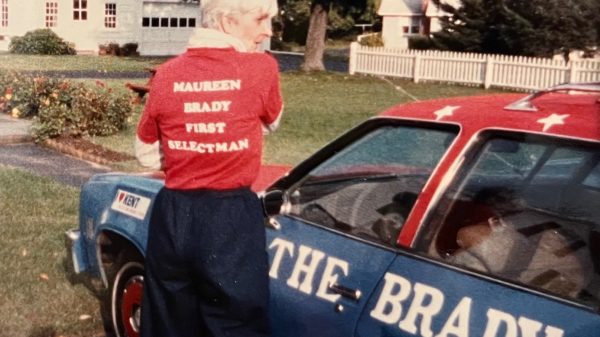KENT—A merry band of would-be Bridge players gather every Saturday from 1 to 4 p.m. in the Congregational Church office building on North Main Street, behind the Thrift Shop.
Robert Norton instructs those new to the game and those who want to brush up on their game.
It is one of two sessions for Bridge players sponsored by the Park & Rec Commission, with experienced players meeting Thursday, 1 to 4 p.m., and new players on Saturdays during the same hours.
Norton, who has been playing Bridge since 1964, said he has always enjoyed its intellectual challenge. “There is a lot of thought and planning,” he said as he guided Ginnie and Jonathan Kagan and Joanne Pappano through the intricacies of the game. “It is a game of strategy, but there is some luck.”
“I haven’t seen the luck yet,” observed Ginnie Kagan wryly. The Kagans haven’t played Bridge in 30 years and were brushing up their skills.
Assisting Norton was Cooper Botway, who proclaimed himself to be “a master player” who can “challenge” the instructor in a game. Botway and Ginnie Kagan bantered through the game, deliberately misstating each other’s names as Botway circled the table, tutoring the players.
The two instructors agreed that Bridge takes a while to learn, but say it is an engaging game once mastered. “I think it’s the greatest game in the world,” declared Norton. “People today are so afraid to go out. This game is the grease that makes society.”
Indeed, Bridge, which was once a staple of social intercourse, faded a bit after the 1950s as more women entered the workforce and computers encouraged online games. It is now enjoying a rebirth, perhaps because people are wearying of sitting alone in their homes. Ironically, technology has also made it possible to play online, so in-person coffee and cards are no longer de rigueur.
“The New York Times no longer has its Bridge column, but you can play with anyone anywhere in the world with Bridge Base Online—although you might have to get up in the middle of the night,” said Ginnie Kagan.
Players are partnered across the table, north-south and east-west. They engage in terse communication that signals to their partner what suits they have and the relative strength of the cards have in their hands. But the communication cannot extend to illegal signals such as clearing your throat, scratching your nose, or pulling your ear lobe. “That could get you thrown out of a tournament,” said Norton.
“You don’t want to mislead your partner,” he continued. “What you bid tells your partner what suits you are strong in. Then you have to remember which cards have been played.”
He asserted that an astute player could predict what cards are in all the other players’ hands based on the bids they make. But no sooner had Norton and Botway confidently predicted what cards Jonathan Kagan was holding than Kagan proved them wrong—placing an ace of Hearts on the table to take the trick.
The games are free of charge. To sign-up contact Robert Norton at 860-672-8158 (call or text).






























